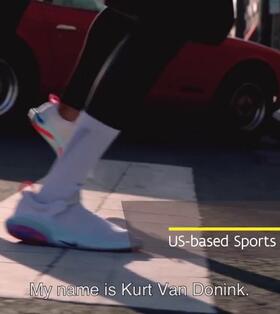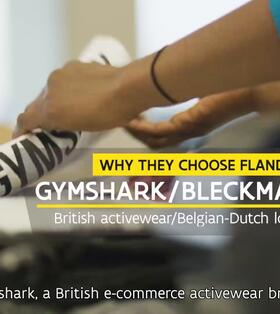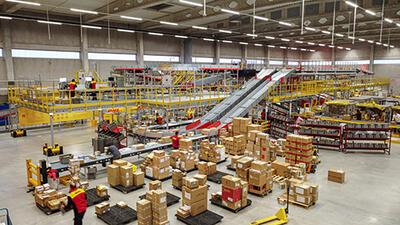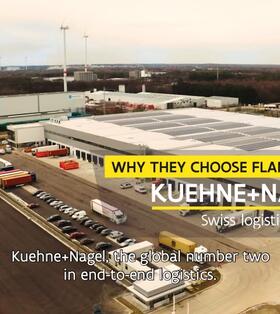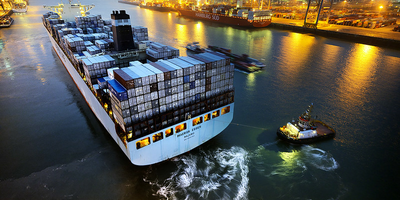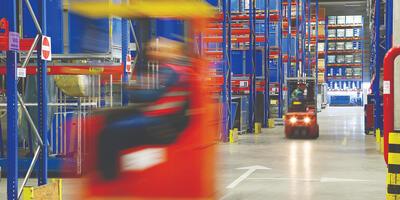
Logistics & distribution
Did you know? Around 60% of Europe’s purchasing power is situated within 500 km of Flanders, enabling you to reach Europe’s main markets in under 24 hours. This is just one of many reasons why the northern region of Belgium is an ideal place to set up logistics and distribution operations in Europe. Discover 5 business scenarios for doing just that – and get inspired by examples of logistics investments by companies such as Nike, Gymshark, DHL Express and Kuehne+Nagel.
Get your European logistics rolling from Flanders (free guide)Is your company looking to roll out logistics and distribution activities in Europe? Flanders Investment & Trade stands ready to assist! Our practical guide explains how to set up a logistical base in Flanders and reach the European market in no time. Download your free copy |
Welcome to Flanders, hotspot for logistics investments
Flanders, the northern region of Belgium, is right in the middle of the action. West of Germany, north of France, south of the Netherlands, just a hop away from the UK and with Brussels as its capital, Flanders’ strategic location is your key to unlocking the EU single market.
In short, Flanders is a dream destination for your logistics investments because of various strengths. These include the region’s:
- strategic location and access to major industrial markets and consumer bases
- high-quality multimodal infrastructure and extended gateways
- interconnected and high-performance international seaports and airports
- very dense rail, road and inland waterway networks
- impressive portfolio of European distribution centers (EDCs)
- innovative ecosystem of logistics knowledge institutions and clusters
-
stable political, social and fiscal landscape, highly globalized economy and business-friendly environment
How Nike (US) builds the supply chain of the future in Flanders
|
In the early nineties, American sports goods manufacturer Nike opened its first distribution center in Flanders, in the town of Laakdal. Over the years, the center developed into Nike’s European Logistics Campus (ELC), with sites in 3 different locations: Laakdal, Meerhout and Ham. Flanders and Nike have made a great team for decades. Since building a sportswear distribution center in Laakdal in 1994, the company has opened several other logistics sites for sports footwear, apparel and equipment in the region. Between 1994 and 2019, several local logistics investment projects were completed, the fourth of which – Nike’s Wings DC in the town of Ham – even earned the company the 2016 Foreign Investment of the Year Trophy presented by Flanders Investment & Trade (FIT). |
Tap into Flanders’ e-commerce potential
Not only is the e-commerce market in Flanders growing by the day, the local logistics landscape also offers online sales players an ideal springboard to millions of consumers in the region and the rest of Europe. The proof? Flanders’ consistent top ranking in the Logistics Performance Index for e-commerce success factors such as:
- predictable and reliable supply chains;
- competitively priced international shipments;
- high-quality, on-time delivery.
How Gymshark and Bleckmann double down on e-commerce in Flanders
|
As an online-only sportswear brand, British Gymshark highly values its engaged community and prioritizes its promise of a smooth shopping experience. When searching for a third-party logistics (3PL) partner, Gymshark sought a firm that could support them in keeping that promise. “We were looking for an e-commerce logistics expert that could serve as an extension of our own brand,” Steve Hewitt explains. “That’s why we went with Bleckmann: they share our values. It felt like the right fit from day one.” The partnership started in 2017 and became a long-term commitment centered around Bleckmann and Gymshark’s distribution center in Rieme, Flanders. Reinardt Van Oel: “The town’s excellent location – close to the Port of Antwerp and North Sea Port Ghent as well as several major highways – was a great bonus. So was the proximity to the city of Ghent, with its excellent university and access to talent as well as resources in cleantech, mobility and other domains.” |
Leverage a range of tax measures and incentives
Flanders’ business climate is geared to your objectives and needs. You can benefit from a stable tax environment and effective tax measures that help you on numerous fronts, including the following.
Avoid legal pitfalls with tax rulings
As a powerful risk management instrument, tax rulings offer you legal certainty on the application of tax laws. Once you have obtained an advance decision from Belgium’s Service for Advance Decisions, there will be no unpleasant tax surprises. Note the availability of a cost-plus method if your company decides to only locate its distribution activities in Flanders and seeks to compensate for the costs of these activities. This cost-plus percentage can climb from 3 to 6% of operational costs.
Offset operational or financial income and lower your company’s effective tax rate in the process
That’s where the notional interest deduction comes in: firms using their own resources to finance their activities can deduct a specific percentage of their ‘adjusted’ equity capital from taxable profits.
Boost your logistics innovation efforts
Various R&D tax incentives, structural funding options and support measures are available in Flanders: from the innovation income deduction to R&D tax credits and payroll tax incentives, tax-free expat status and more.
5 scenarios for getting your logistics rolling in Flanders
From market penetration to resource allocation and corporate tax: starting logistics operations in Europe comes with many strategic facets to consider. Depending on your company’s needs, scale and industry, below are five scenarios – each with its own tax and legal aspects – to help you on your way and conquer the European market from Flanders.
Scenario 1: market intelligence & representation office
A market intelligence & representation office does not constitute a legal entity in Belgium and Flanders as a region, but it gives you a presence in the country. From such an office, you can only carry out market research and representation activities (no sales activities or sales support).
Which tax aspects apply?
- The fact that a representation office is not considered a Permanent Establishment (PE) means there is no tax liability.
- No VAT PE and no VAT registration (unless the representation office is liable to pay VAT on incoming intra-Community services ‘consumed’ by the representation office).
- Belgian input VAT can be recovered via the VAT credit refund procedure for non-established and non-VAT registered foreign entities.
Scenario 2: storage of stock of goods
This scenario means you own stock (finished goods), stored in Belgium with a third-party logistics provider. But your business does not constitute a legal entity in Belgium, and you carry out no other activities in the country.
Direct tax aspects
- Under Belgian tax law, you have a Belgian Permanent Establishment (PE).
- However, if your country is one of the 90+ nations that have signed a double tax treaty with Belgium, a pure stock is not a taxable PE.
Indirect tax aspects
- Within the EU: only VAT liabilities. Outside the EU: VAT and customs liabilities.
- Storage of goods is never a PE for VAT purposes.
- VAT registration is needed if you put the goods into free circulation in the EU.
- To avoid pre-financing of import VAT, an import VAT deferral license (an ‘ET 14000 license’) without any cash guarantee can be used.
- However, supply of goods to Belgian, EU or non-EU customers is generally subject to VAT.
- Customs warehouse benefits apply.
- Customs and excise duty implications (import/storage formalities, valuation, paperless declarations and electronic communication).
- An indirect customs representative will be required.
- Input VAT can be deducted via the periodic VAT return when a Belgian VAT is registered.
Scenario 3: value-added logistics & services
In this scenario, you provide value-added logistics (VAL) and value-added services (VAS) in Belgium, including after-sales service. While your business does not constitute a legal entity in Belgium, it is considered a Belgian Permanent Establishment (PE). Furthermore, you own stock that is stored and managed in the warehouse of a Belgian PE.
Direct tax aspects
- Profits attributed to Belgian PEs are taxable in Belgium.
- Taxable profits of Belgian PEs can be determined on a cost-plus basis.
- Upfront ruling can be obtained on low mark-up.
Indirect tax aspects
- For indirect tax aspects on stock, see scenario 2.
- Depending on whether the Belgian PE is managed by a person who can legally bind the company, the Belgian PE will be required to register as an established taxable person or a foreign taxable person.
- When registered for VAT in Belgium, input VAT can be deducted via the periodical VAT return.
- No VAT on value-added logistics or value-added services of the Belgian PE to your head office unless one of them is part of a VAT group.
Scenario 4: European distribution center & regional warehouse
European Distribution Centers, or EDCs, are set up as Belgian legal entities. They own goods (stored in regional warehouses), deliver value-added services (VAS) to regional warehouses, and employ staff locally. Furthermore, EDCs can set up Permanent Establishments (PEs) – i.e., regional warehouses – of a Belgian entity in other EU countries.
Direct tax aspects
- As a Belgian entity, the EDC is taxable in Belgium.
- The taxable profits of the EDC can be determined on a cost-plus basis.
- Upfront ruling can be obtained on mark-up.
- Belgian EDCs have no foreign PE if they only carry out storage activities in foreign countries, depending on whether a tax treaty has been signed; all profits are taxable in Belgium.
- If the EDC is deemed a foreign PE, arm’s length profit allocation is required; profit of a foreign PE is exempted in Belgium.
Indirect tax aspects
- Belgian VAT registration is needed, and full (VAT) bookkeeping is obliged.
- If the goods are stored at regional warehouses in other EU countries, the Belgian EDC may need to register for VAT in those countries.
- The supply of goods to Belgian, EU or non-EU customers by the Belgian EDC is subject to VAT.
- VAT treatment of cross-border supplies depends on terms of supply.
- To avoid pre-financing import VAT, an import VAT deferral license (i.e., an ET 14000 license) can be obtained without any cash guarantee. Align customs value to the transaction price.
- A ruling in respect of classification, origin and customs value is advisable.
- Cross-border authorizations, entry into declarant’s records and centralized customs clearance apply.
- Belgian input VAT can be deducted via the periodical VAT return.
- VAT credits are refundable on a quarterly basis; for ‘export’ businesses, a license for monthly refunds is available.
Case: Kuehne+Nagel boosts its value chain hub in Flanders
|
“Flanders has everything we need for logistics success!” Tobias Jerschke, managing director of Kuehne+Nagel BeNeLux, is up front about his company’s penchant for Flanders’ logistics ecosystem. In 2020, the Swiss logistics services provider opened a new logistics center for pharma and healthcare products at the Brussels Airport freight area Brucargo in Machelen. What’s more, in that same year, Kuehne+Nagel began constructing a new European distribution center worth EUR 75 million in Tessenderlo, creating 150 jobs in 2021 and another 350 in the following years. Kuehne+Nagel’s dedication to Flanders is no coincidence: “Flanders is in a perfect location for e-commerce and logistics. It offers major logistics potential and boasts excellent inland waterway infrastructure, connections to other European countries via motorways, a flexible labor framework, and more.” |
